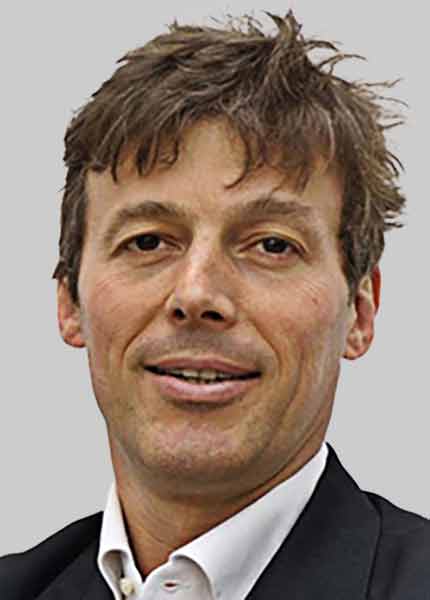
President
Head of Clinical Neuroimmunology Unit
Institute of Experimental Neurology
INSpe Division of Neuroscience
San Raffaele Hospital (Milan, Italy)
Roberto Furlan graduated in medicine at the University of Milano in 1991.
After the MD degree, in 1992 he was visiting scientist in the Department of Neurology from the University of Chicago, working on HTLV-I.
The following year (1993) he completed a research project on HTLV-I in the Clinical Laboratories of the Sao Rafael Hospital in Salvador-Bahia, in Brazil.
From 1994 to 1995 he worked as a post-doctoral fellow in the Department of Molecular Genetics and Biochemistry, University of Pittsburgh, Pittsburgh, USA on HSV-1-mediated gene therapy of the central nervous system.
Using HSV-1-derived vectors he performed gene therapy studies in multiple sclerosis models and in 2001 he obtained his PhD at the Open University of London working in the Neuroimmunology Unit of the San Raffaele Scientific Institute, Milan, Italy.
Since 2001 tenure-track research assistant Senior scientist in the Neuroimmunology Unit of the San Raffaele Scientific Institute, he completed in 2007 the residency in neurology.
Since 2004, non-tenured professor at Vita e Salute San Raffaele University, Milan.
Since 2009, Group leader and then Head of Unit of the Clinical Neuroimmunology Unit, Institute of Experimental Neurology, Division of Neuroscience, San Raffaele Scientific Institute, Milan.
Since 2011 Secretary treasurer of the International Society of NeuroImmunology.
Since 2013 Academic Editor for Plos One.
2017-2021 Deputy Director of the Institute of Experimental Neurology – INSpe, San Raffaele Scientific Institute, Milan.
Since 2019 President of the Italian Neuroimmunology Association – AINI
Since 2022 Director of the Institute of Experimental Neurology – INSpe, San Raffaele Scientific Institute, Milan.
He has published over 200 papers on peer reviewed international journals.
Current H-index = 71, 46 in the last five years.
1. Furlan R, Martino G, Galbiati F, Poliani PL, Smiroldo S, Bergami A, Desina G, Comi G, Flavell R, Su MS, Adorini L. Caspase-1 regulates the inflammatory process leading to autoimmune demyelination. J. Immunol. 1999 163:2403-2409
2. Del Maschio A, De Luigi A, Martin-Padura I, Brockhaus M, Bartfai T, Fruscella P, Adorini L, Martino G, Furlan R, De Simoni MG, Dejana E. Leukocyte recruitment in the cerebrospinal fluid of mice with experimental meningitis is inhibited by an antibody to Juncional Adhesion Molecule (JAM). J. Ex. Med. 1999;190:1351-1356
3. Furlan R, Brambilla E, Ruffini F, Poliani PL, Bergami A, Marconi PC, Franciotta DM, Penna G, Comi G, Adorini L, Martino G. Intrathecal delivery of IFNγ protects C57BL/6 mice from chronic-progressive experimental autoimmune encephalomyelitis by increasing apoptosis of CNS-infiltrating lymphocytes. J. Immunol. 2001; 167:1821-1829
4. Martino G, Furlan R, Comi G, Adorini L. The ependymal route to access the central nervous system: an emerging immuno-gene therapy approach to multiple sclerosis. Trends Immunol. 2001; 22:483-490
5. Furlan R, Brambilla E, Sanvito F, Roccatagliata L, Olivieri S, Bergami A, Pluchino S, Uccelli A, Comi G, Martino G. Vaccination with amyloid-bea peptide induces autoimmune encephalomyelitis in C57BL/6 mice. Brain. 2003;126:285-291
6. Pluchino S, Quattrini A, Brambilla E, Gritti A, Salani G, Dina G, Galli R, Bergami A, Furlan R, Delcarro U, Amadio S, Comi G, Vescovi Al, Martino G. Intravenous and intracerebroventricular injection of adult neurospheres induces clinical recovery in a chronic model of multiple sclerosis. Nature 2003; 422:688-694
7. Furlan R. Bargami A, Cantarella D, Brambilla E, Taniguchi M, Dellabona P, Casorati G, Martino G. Activation of invariant NKT cells by α-GalCer administration protects mice from MOG35-55-induced EAE: a critical role for administration rout and IFNγ. Eur J Immunol. 2003; 33:1830-1838
8. Pluchino S, Zanotti L, Rossi B, Brambilla E, Ottoboni L, Salani G, Martinello M, Cattalini A, Bergami A, Furlan R, Comi G, Constantin G, Martino G. Neurosphere-derived multipotent precursors promote long-lasting neuroprotection by an immunomodulatory mechanism. Nature 2005 436:266-271
9. Rovaris M, Confavreux C, Furlan R, Kappos L, Comi G, Filippi M. Secondary progressive MS: current knowledge an future challenges. Lancet Neurol. 2006 5:343-354
10. Butti E, Bergami A, Recchia A, Brambilla E, Franciotta D, Cattalini A, Stornaiuolo A, Comi G, Mavilio F, Martino G, Furlan R. Absence of an intrathecal immune reaction to a HD adenoviral vector delivered into the cerebrospinal fluid of non-human primates. Gene Ther. 2008 15:233-238
11. Centonze D, Muzio L, Rossi S, Cavasinni F, De Chiara V, Bergami A, Musella A, D’amelio M, Cavallucci V, Martorana A, Bergamaschi A, Cencioni Mt, Butti E, Comi G, Bernardi G, Cecconi F, Battistini L, Furlan R, Martino G. Inflammation triggers synaptic alteration and degeneration in experimental autoimmune encephalomyelitis. J Neurosci. 2009 29:3442-52.
12. Esposito M, Ruffini F, Bergami A, Garzetti L, Borsellino G, Battistini L, Martino G, Furlan R. IL-17 and IFN-γ secreting FoxP3+ T cells infiltrate the target tissue in experimental autoimunity. J Immunol. 2010 185:7467-73
13. Verderio C, Muzio L, Turola E, Bergami A, Novellino L, Ruffini F, Riganti L, Corradini I, Francolini M, Garzetti L, Maiorino C, Servida F, Vercelli A, Dalla Libera D, Martinelli V, Comi G, Martino G, Matteoli M, Furlan R. Myeolid microvesicles are a marker and therapeutic target for neuroinflammation. Ann. Neurol. 2012 72:610-624
14. Maiorino C, Khorooshi RMH, Ruffini F, Løbner M, Bergami A, Garzetti L, Martino G, Owens T, Furlan R. IL-25 protects from neuroinflammation by modulating microglia. Gene Ther. 2013 20:487-496
15. Agosta F, Dalla Libera D, Gioele Spinelli E, Finardi A, Canu E, Bergami A, Bocchio Chiavetto L, Baronio M, Comi G, Martino G, Matteoli M, Magnani G, Verderio C, Furlan R. Myeloid microvesicles in CSF are associated with myelin damage and neuronal loss in mild cognitive impairment and alzheimer disease. Ann. Neurol. 2014 doi: 10.1002/ana.24235
16. Casella G, Finardi A, Descamps H, Colombo F, Maiorino C, Ruffini F, Patrone M, Degano M, Martino G, Muzio L, Becher B, Furlan R. BIL-27, but not IL-35, inhibits neuroinflammation through modulating GM-CSF expression. Scientific Reports. 2017 7:16547. doi: 10.1038/s41598-017-16702-w
17. Colombo F. Bastoni M. Nigro A, Podini P, Finardi A, Casella G, Ramesh M, Farina C, Verderio C, Furlan R. Cytokines stimulate the release of microvesicles from myeloid cells independently from the P2X7-receptor/acid sphingomyelinase pathway. Front. Immunol. In press.
18. Casella G, Finardi A, Descamps H, Colombo F, Maiorino C, Ruffini F, Patrone M, Degano M, Martino G, Muzio L, Becher B, Furlan R. IL-27, but not IL-35, inhibits neuroinflammation through modulating GM-CSF expression. Scientific Reports. 2017 7:16547. doi: 10.1038/s41598-017-16702-w
19. Colombo F, Bastoni M, Nigro A, Podini P, Finardi A, Casella G, Ramesh M, Farina C, Verderio C, Furlan R. Cytokines stimulate the release of microvesicles from myeloid cells independently from the P2X7-receptor/acid sphingomyelinase pathway. Front. Immunol. 2018 doi: 0.3389/fimmu.2018.00204
20. Casella G, Colombo F, Finardi A, Ill-Ragaa G, Spinelli A, Podini P, Bastoni M, Descamps H, Muzio L, Furlan R. Phagocytes-targeted extracellular vesicles containing IL4 inhibit neuroinflammation in a mouse model of multiple sclerosis. Mol. Ther. 2018 26:2107-2118. doi: 10.1016/j.ymthe.2018.06.024.
21. Furlan R, Melloni E, Finardi A, Vai B, Di Toro S, Aggio V, Battistini L, Borsellino G, Manfredi E, Falini A, Colombo C, Poletti S, Benedetti F. Natural Killer cells protect white matter integrity in Bipolar Disorder. Brain Behav Immun. 2019 doi: 10.1016/j.bbi.2019.06.037
22. Colombo F, Casella G, Podini P, Finardi A, Racchetti G, Norton E.G., Cocucci E., Furlan R. Polarized cells display asymmetric 1 release of extracellular vesicles. Traffic 2020 doi: 10.1111/tra.12775.
23. De Lorenzo R, Loré N, Finardi A, Mandelli A, Cirillo DM, Tresoldi C, Benedetti F, Ciceri F, Rovere-Querini P, Comi G, Filippi M, Manfredi AA, Furlan R. Blood neurofilament light chain and total tau levels at admission predict death in COVID-19 patients. J Neurol. 2021 doi: 10.1007/s00415-021-10595-6.
24. Gelibter S Pisa M, Croese T, Finardi A, Mandelli A, Sangalli F, Colombo B, Martinelli V, Comi G, Filippi M, Furlan R. Spinal fluid myeloid microvesicles predict disease course in multiple sclerosis. Ann. Neurol. 2021 DOI:10.1002/ana.26154.
25. Gelibter S, Marostica G, Mandelli A, Siciliani S, Podini P, Finardi A, Furlan R. The impact of storage on extracellular vesicles: a systematic study. J Extracell Vesicles. In press

Vice-President
Chair of the Department of Neurology and Neurophysiology,
Medical Center – University of Freiburg
Freiburg | Germany
Heinz Wiendl is professor of Neurology and chair of the Department of Neurology and Neurophysiology at the Medical Center – University of Freiburg since 1st October 2024. His research is dedicated to understand immune regulation and the functional interaction between the immune and the nervous system. Within this, he focusses on immuneregulation in MS and autoimmune nervous system disorders, inflammatory mechanisms of neurodegeneration, biomarkers and biosignatures related to neuroinflammatory diseases, and immune therapy and its adverse effects.
Prof. Wiendl studied medicine in Germany, Switzerland and USA. He has been a research fellow at the Institute of Neuroanatomy at the University of Erlangen-Nuremberg and at the Max Planck Institute for Neurobiology (Martinsried). Heinz Wiendl worked as a clinical and research fellow at the Department of Neurology Tuebingen, where he was awarded as a junior group leader for neuroimmunology, received his board certification and completed his habilitation. He was appointed as a professor of neurology and head of the clinical research group for MS and neuroimmunology in Wuerzburg in 2005 and acted as a vice-chair of the Department of Neurology. In 2010, he was recruited to the University of Muenster, where he accepted the position as a director of the Department of Neurology – Inflammatory Diseases of the Nervous System and Neurooncology after turning down parallel offers. From 2013 to 2024, he was director of the Department of Neurology in Muenster to which the Institute of Translational Neurology has been associated since 2018. He acted as dean for research and young academics of the medical faculty Muenster, and as representative of the academia in the University clinic’s board of directors.
Heinz Wiendl is founding speaker of the national German Competence Network of MS (KKNMS; 2009 to 2012), and acts as a speaker since 2019. In addition, he is speaker of the comprehensive research center CRC TR 128 “Multiple Sclerosis” funded by the German Research Foundation (DFG) and steering committee member of the Muenster excellence cluster “Cells in Motion” (CiM). He is principal investigator of the cluster of excellence “Cells in Motion” (funded by the DFG and the German Council of Science and Humanities (WR)) since 1st August 2013. In 2016, Prof. Wiendl was appointed representative of the academia in the Board of directors of the University Hospital Muenster (UKM). He is member of several boards, advisory and expert committees such as the executive board of the advisory board of the German MS patient organization (DMSG), the scientific advisory committees for the International Conferences on HLA-G and the German Society for Muscular Diseases (DGM), member of the Multiple Sclerosis Therapy Consensus Group (MSTCG) and the executive board of the German Neurologists Council (BDN). Since 2017 he is honorary professor at the Sydney university medical school. He is the founding director of the Muenster Body&Brain Institute, a research building dedicated to translational research in neuro-psychiatric disorders and funded by the German ministery.
Prof. Wiendl acts as reviewer of various scientific journals and national as well as international funding and non-profit organizations. Recently he has been appointed member of the expert committee on neurosciences at the DFG. His scientific achievements have been recognized by the Felix Jerusalem award of the DGM (2003), the Heinrich Pette award of the German Neurological Society (DGN, 2009), the Sobek junior (2005) as well as the senior award (2015) for MS research of the DMSG. His research and clinical activities are reflected by more around 700 publications in peer reviewed journals, multiple book chapters, the treatment guidelines for myasthenia gravis, myositis syndromes and multiple sclerosis and five edited books.
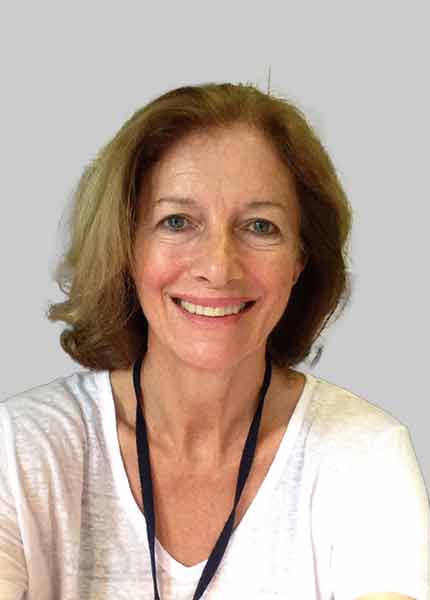
Secretary/Treasurer
Hellenic Pasteur Institute
Athens | Greece
Studied Biology and received her PhD in Medicine from the University of London, UK. She trained as post-doc at the Universities of London (Imperial College) and Cambridge (Laboratory of Molecular Biology), UK and in the Laboratory of Molecular Genetics at the Hellenic Pasteur Institute (HPI) in Athens, Greece. Since 2000 she has been head of the Laboratory of Molecular Genetics at the HPI.
Her main research interest is the interface between the immune system and the central nervous system (CNS), particularly the participation of the immune system in physiological brain processes such as host defense, and in inflammatory diseases such as multiple sclerosis (MS). The laboratory has a long-standing interest in understanding the functions of a pro-inflammatory cytokine, tumor necrosis factor (TNF), in the CNS. TNF drives inflammatory responses to infection, injury and neurodegeneration, but paradoxically also protects neurons, directly and indirectly by repairing the myelin sheath around demyelinated axons. This diversity of TNF function is now understood to be a direct reflection of its complex biology. “TNF” represents at least a two-ligand (soluble TNF and membrane TNF), two-receptor (TNF receptors 1 and 2/TNFR1 and TNFR2) system with ligands and receptors both differentially expressed and regulated on different cell types. Through the application of sophisticated spatial and temporal gene-targeting techniques in mice, it is possible to dissect the individual functions of the two TNFs and their receptors in a number of important brain processes through the study of experimental disease models. In general soluble TNF/TNFR1 interactions dominate inflammatory responses, which often leading to significant secondary tissue damage and also strongly inhibit remyelination. In contrast, membrane TNF/TNFR2 interactions promote remyelination and neuroprotection, by enhancing oligodendrocyte precursor cells.
The ability to separate deleterious and beneficial effects of TNF at a molecular level has direct implications for therapy in human disease. Non-selective TNF inhibitors that block the effects of both soluble and membrane TNF and are blockbuster drugs for peripheral inflammatory diseases such as rheumatoid arthritis, behave badly in the CNS. They exacerbate MS and can even induce de novo demyelinating disease. The experimental data now clearly suggest that selective inhibition of soluble TNF and/or TNFR1, while preserving membrane TNF and/or TNFR2, is a promising future direction for safe immunotherapy in chronic inflammatory diseases of the CNS like MS.
Lesley has 81 original research publications and reviews in international journals and serves as an ad hoc reviewer for numerous international journals and funding bodies. She is a member of the Board of the European School of Neuroimmunology (ESNI), Vice-President of the Hellenic Academy of Neuroimmunology (HELANI), and Secretary/Treasurer of the International Society of Neuroimmunology.

Past-President
Kuchroo Weiner Distinguished Professor of Neuroimmunology
Ann Romney Center for Neurologic Diseases
Brigham and Women’s Hospital
Harvard Medical School
Associate Member,
The Broad Institute of Harvard and MIT
Boston (MA) | USA
Francisco J. Quintana, PhD is a Professor of Neurology at the Ann Romney Center for Neurologic Diseases, at Brigham and Women’s Hospital, Harvard Medical School, and an Associate Member at the Broad Institute of Harvard and MIT. Dr. Quintana is also the President of the International Society of Neuro Immunology (ISNI).
Dr. Quintana, a graduate of the University of Buenos Aires (1999, Argentina), obtained his PhD in immunology at the Weizmann Institute of Science (2004, Israel). He received postdoctoral training at the Weizmann Institute of Science and Harvard Medical School. In 2009, Dr. Quintana joined the faculty of Harvard Medical School.
Dr. Quintana’s research is focused on Neuroimmunology, investigating signaling pathways that control inflammation and neurodegeneration, with the ultimate goal of identifying novel therapeutic targets and biomarkers for immune-mediated and neurodegenerative disorders. Dr. Quintana has published over 200 peer reviewed articles and book chapters. Dr. Quintana’s work identified an important role for the transcription factor AHR in the control of inflammation driven by adaptive and innate immune cells. His work has also defined novel mechanisms by which cell-cell interactions, metabolism, the microbiome, and environmental chemicals control CNS resident cells in health and disease. In addition, Dr. Quintana’s research has resulted in multiple patents which have been the foundation of four companies.
Dr. Quintana is the recipient of the Lady Anne Chain Prize for Academic Excellence and Scientific Achievements, the Junior Investigator Award from the National Multiple Sclerosis Society, the Pathway to Independence Award of the National Institute of Allergy and Infectious Diseases, the Award for Outstanding Research Achievement form Nature Biotechnology, the Tecan Award for Innovation, the Harry Weaver Award from the National Multiple Sclerosis Society, the Mentor Award from Harvard Medical School, the Milestones in Multiple Sclerosis Research Award from the National Multiple Sclerosis Society, the American Association of Immunologists-BD Biosciences Investigator Award, ISI Most Highly Cited List and the Barancik Prize of Innovation in Multiple Sclerosis Research. In 2021, Dr. Quintana was named the Kuchroo Weiner Distinguished Professor of Neuroimmunology.
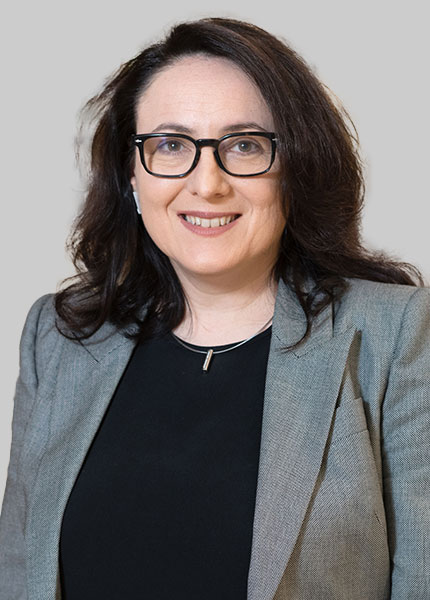
Senior Investigator, Gladstone Institutes
Professor, Department of Neurology
University of California, San Francisco
San Francisco (CA) | USA
Dr. Katerina Akassoglou is a Senior Investigator at the Gladstone Institutes, and a Professor in the Department of Neurology at University of California, San Francisco.
Dr. Akassoglou has pioneered studies on the mechanisms that control the communication between the brain, immune and vascular systems – and in particular the role of the blood clotting factor fibrinogen as a common thread in a wide range of neurologic diseases, such as multiple sclerosis, Alzheimer’s disease and neurodegenerative diseases. Dr. Akassoglou’s research on transcriptional profiling of oxidative stress discovered neurotoxic CNS innate immune cell populations and therapeutic targets in neuroinflammation.
Dr. Akassoglou developed cutting-edge imaging tools to study the neurovascular interface and discovered a novel fibrin-targeting immunotherapy and small molecule compounds to protect the brain from pathogenic neuroinflammation. Her team has had a long-standing funding from the NIH, the National MS Society, the American Heart Association, Race to Erase MS, the Conrad N. Hilton Foundation, and the Department of Defense.
Dr. Akassoglou has published over 100 papers and book chapters, has led several national and international collaborations with academia and pharma, is the scientific founder of the university spin-out Therini Bio, a named inventor on ten issued and several pending patents, and she is active in many scientific societies, editorial boards, and funding agencies. She was awarded the Presidential Early Career Award for Scientists and Engineers by the White House, the John J. Abel Award, the Dana Foundation for Brain and Immunoimaging Award, the Vilcek Prize for Creative Promise honor, The Marilyn Hilton Award for Innovation in Multiple Sclerosis Research, the NIH R35 Research Program and EUREKA Awards, and the Barancik Prize for Innovation in MS Research. Dr. Akassoglou is a Fellow of the American Neurological Association (ANA), the American Association for Pharmacology and Experimental Therapeutics (ASPET), the National Academy of Inventors (NAI) and the American Association for the Advancement of Sciences (AAAS).
She was named by the San Francisco Business Times among the 2021 Most Influential Women in Bay Area Business.

Professor of Neuroimmunology
Head, Brain Autoimmunity Group
Kids Neurosciences Centre at Kids Research, the Children’s Hospital at Westmead
School of Medical Sciences
The University of Sydney
Sydney, Australia
Prof. Fabienne Brilot obtained her PhD in Belgium and at the JD Gladstone Institutes, UCSF, USA. She then became postdoctoral fellow under the mentorship of Professor Christian Munz (currently located at the University of Zurich, Switzerland) at the Browne Center for Immunology and Immune Diseases headed by late Professor Ralph Steinman (Nobel Prize for Medicine 2011) at the Rockefeller University, USA. She was recruited at the Children’s Hospital at Westmead in Sydney in 2007 where she started the Brain Autoimmunity group.
Fabienne is currently Principal Research Fellow at the University of Sydney, and her research focuses on immune-mediated brain disorders such demyelinating disorders, such as Myelin Oligodendrocyte Glycoprotein Antibody-associated Disease (MOGAD) and autoimmune neurological diseases. Her group aims to discover biomarkers and explores the autoimmune response in patients to improve their diagnosis and treatment.
She is a member of ISNI International Advisory Board, and chairs the Membership and Engagement committee. She was the scientific chair of the 14th ISNI Congress (Australia, Brisbane, 2018), and the co-convenor of the 3rd Asia-Pacific School of Neuroimmunology (Sydney, 2023). She is the President of Neuroimmunology Australia. She reviews for many journals and is an editorial board member for several journals in the field of neuroimmunology.
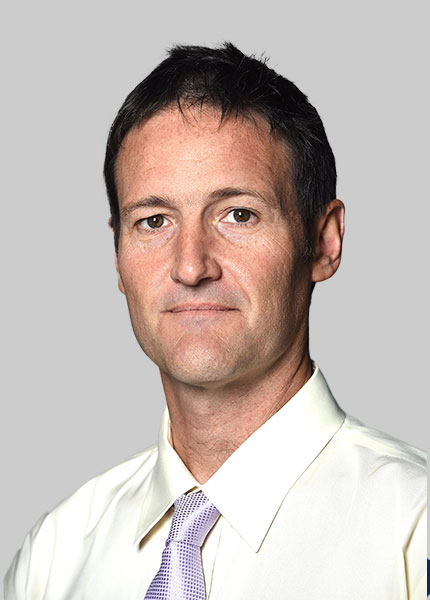
Professor
Professorship in Neurology I
Heidrich Family and Friends Endowed Chair in Neurology
Weill Institute for Neurosciences
Department of Neurology,
Graduate Program in Bioinformatics
Institute for Human Genetics
Institute for Computational Health Sciences
University of California San Francisco
San Francisco (CA), USA
Sergio E. Baranzini is Distinguished Professor of Neurology at the University of California San Francisco (UCSF). He earned his PhD in human molecular genetics (1997) from the University of Buenos Aires, Argentina. His lab at UCSF uses a multi-disciplinary approach to science and it is composed by experimental and computational researchers. Dr. Baranzini is an active member of the International Multiple Mclerosis Genetics Consortium, where his team leads a large GWAS on disease progression. He also leads the iMSMS, an international consortium to study the effect of bacterial populations (microbiota) on MS susceptibility and progression. In addition, he is the principal investigator of SPOKE, a large multi-disciplinary bioinformatics approach to gather, integrate and analyze all biomedical data, currently supported by NIH and NSF.
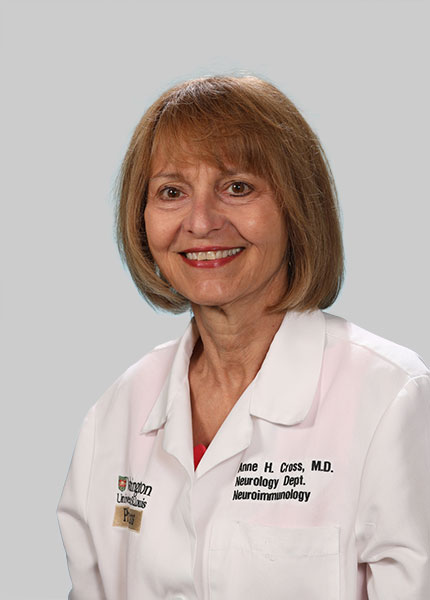
Department of Neurology
Washington University School of Medicine
St. Louis (MO), USA
Anne H. Cross is a professor of Neurology at Washington University in St. Louis, where she holds the Manny & Rosalyn Rosenthal – Dr. John L. Trotter MS Center Chair in Neuroimmunology and is Head of the Multiple Sclerosis & Neuroimmunology Section. Dr. Cross grew up in Mobile Alabama. She received her M.D. from the University of Alabama School of Medicine, completed neurology residency at George Washington University, and was a post-doctoral fellow in neuroimmunology at the National Institutes of Health and later at Albert Einstein College of Medicine. She received the Harry Weaver Neuroscience Scholar award of the National Multiple Sclerosis Society USA in 1990.
Since 1991, Dr. Cross has been on the faculty of the Department of Neurology at Washington University, working as a clinician and teacher, and performing translational research focused on MS. In 2001, Dr. Cross began the first Phase 2 study of B cell depletion in MS patients as an “add-on” study in MS patients who were suboptimally treated with beta-interferons or glatiramer acetate, finding that adding rituximab reduced MRI activity by 88%.
Her honors include the President’s Achievement Award of Barnes-Jewish Hospital (2010), Faculty Achievement Award of Washington University (2014), and the John Jay Dystel Prize given by the American Academy of Neurology and NMSS (2019). Dr. Cross enjoys mentoring and is proud of her more than 30 prior trainees who are almost all working in MS care or research.

Professor and Chair,
Department of Immunology Temerty Faculty of Medicine,
University of Toronto
Canada Research Chair ( Tissue Specific Immunity)
Toronto | Canada
Jen received her Ph.D. (Immunology) at the University of Toronto in 1998. She went on to do a post-doctoral fellowship at Harvard Medical School studying the complement pathway and then joined Biogen Inc. as a Staff Scientist in 2000. During her tenure at Biogen, she became interested in B cells, Multiple Sclerosis and the TNF superfamily of molecules. After 3 years in Industry, she returned to Academia as an Assistant Professor (Immunology) at the University of Toronto in 2003, in 2015 was promoted to full Professor, and in 2020 was awarded a Tier I Canada Research Chair in Tissue Specific Immunity. Jen’s basic research continues to focus on how members of the TNF superfamily of molecules regulate immunity and autoimmunity. Her team has uncovered a novel gut-brain axis that regulates neuroinflammation. With respect to translational work, Dr. Gommerman has been examining the role of B lymphocytes in Multiple Sclerosis patients and in animal models of MS. More recently she has been studying the antibody response to SARS-CoV-2 in saliva samples from patients with COVID-19. In 2023, she was appointed Chair of the Department of Immunology at the University of Toronto.

Professor and Chairperson
Department of Neurology
Graduate School of Medical Sciences
Kyushu University
Fukuoka City | Japan
Noriko Isobe is a Professor and Chairperson, Department of Neurology, Kyushu University, Japan. Her main focus in both, research and clinics, is on immune-mediated diseases of the central nervous system (CNS) including multiple sclerosis (MS).
Professor Isobe graduated School of Medicine, Kyushu University and completed a PhD at the Department of Neurology, Graduate School of Medical Sciences, Kyushu University.
She worked as a Postdoctoral Fellow at the Department of Neurology, University of California, San Francisco from 2010-2017.
She got special training on MS and had seen and treated many MS patients in the clinic. Furthermore, she also has extensive experience with the diagnosis and management of neuromyelitis optica spectrum disorders (NMOSD), a neurological disease with partially overlapping pathogenesis but distinct etiology from MS.
Her current research interests include genetic susceptibility to MS, genetic determinants of disease progression in MS and NMOSD and T-cell receptor repertoires in MS.
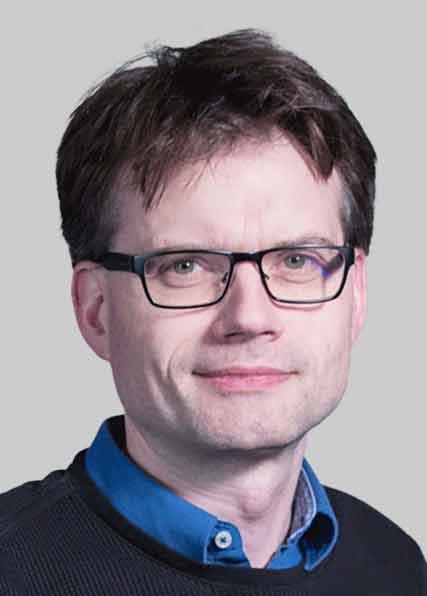
Klinikum rechts der Isar
Technische Universität München, Department of Neurology
Ismaninger Str. 22, 81675 München
1992-1999: Medical school at Julius-Maximilians University Würzburg and the Royal London School of Medicine, State examination
2000 – : Doctoral thesis (summa cum laude)
1999-2005: Residency in clinical neurology (Universities of Würzburg and Homburg)
2005 – : Board approval as fellow neurologist (Facharzt für Neurologie)
2005-2008: Postdoctoral fellow at Harvard Medical School (Laboratory of Prof. Kuchroo)
2009 – : Habilitation and venia legendi in Neurology
since 2008: Attending physician in neurology (Oberarzt) at the Dept. of Neurology, Klinikum rechts der Isar, Technische Universität München
2010-2015: Associate Professor of Neurology
since 2015: Full Professor of Neurology (Experimental Neuroimmunology) at the Dept. of Neurology, Klinikum rechts der Isar, Technische Universität München
Member of the SyNergy initiative, Transregio SFB TR128, SFB 1054

Dr Tanja Kuhlmann MD
University of Münster
Münster | Germany
Dr. Tanja Kuhlmann studied medicine at the University of Göttingen, Germany where she received her medical degree in 1998. She specialized in neuropathology and worked as medical resident and research fellow in different neuropathological departments in Germany and at McGill, Canada in the research groups of Dr. Jack Antel and Dr. Alan Peterson.
In 2008, she became senior consultant and associate professor at the Institute of Neuropatholohgy, University Hospital Münster, Germany and in 2020 part-time adjunct professor, Department of Neurology and Neurosurgery, McGill University. Her key research interests are mechanisms leading to axonal and oligodendroglial pathology in demyelinating diseases. In recent years, she focused her research on iPSC technology and the derivation of human CNS cells from iPSC to study disease mechanisms.
She has published several publications in well-known international journals on the topic of MS pathology, especially on oligodendroglial loss and remyelination as well as studies using iPSC-derived oligodendrocytes and neurons to understand disease mechanisms in demyelinating and neurodegenerative diseases.
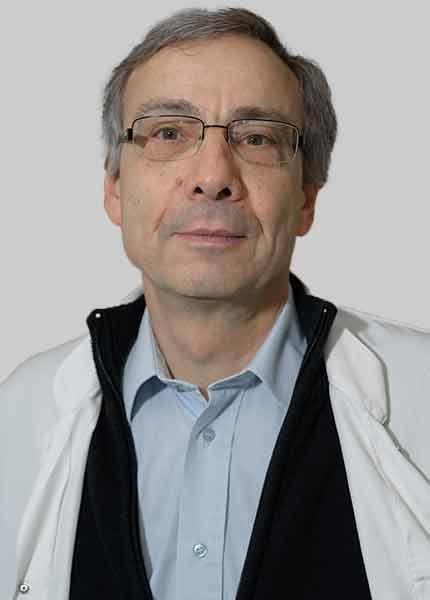
Head of the Neuroimmunology team at Infinity (Inserm U1291-CNRS UMR5051)
Toulouse | France
1990: Medical Doctor degree and Medical Thesis, Paris
1991: Certification, Neurology Specialty Board
1995: PhD, in Immunology, Paris
1999: Accreditation to supervise Research programs
2001: Professor of Clinical Immunology, Toulouse
1983-1989: Residency program in Neurology, Paris
1994-2001: Head of the CSF analysis Laboratory, Salpêtrière Hospital, Paris
Since 2001: Professor of Clinical Immunology, Toulouse
1986: Master in Immunology, Paris (Pr J-F. Bach)
1989-1991: PhD student, Pasteur Institute (Dr M.A. Bach)
1991-1994: Post-doctoral position with Pr H. McDevitt, Stanford University, USA
1996-2002: Head of the Neuro-Immunology Research Team, INSERM CJF97-11 then INSERM U546, Paris
Since 2003: Head of the Autoimmunity and Immunoregulation Research Team, INSERM U563, Toulouse
Since 2007: Chairman of the Department of Immunology and Infectious Diseases, INSERM U563
Since 2009: Deputy Director of the Pathophysiology Research Center of Toulouse Purpan (CPTP-INSERM U563)
2011-2020: Director of the Pathophysiology Research Center of Toulouse Purpan (CPTP-INSERM U1043-CNRS U5282)
Since 2021: Head of the Neuroimmunology team at Infinity (Inserm U1291-CNRS UMR5051)
Medical and Scientific consultancy for:
Reviewing of scientific articles:
Editorial Board member:
Frontiers in Immune Tolerance since 2010, OncoImmunology since 2011, BRAIN Editorial Advisory Board 2015-2020, Journal of Molecular Medicine since 2019.
1. R. Bernard-Valnet, D Frieser, X-H. Nguyen, L. Khajavi, C. Quériault, S. Arthaud, S. Melzi, M. Fusade-Boyer, F. Masson, M. Zytnicki, A. Saoudi, Y. Dauvilliers, C. Peyron, J. Bauer, RS. Liblau. Influenza vaccination induces autoimmunity against orexinergic neurons in a mouse model for narcolepsy. Brain in press.
2. H. Wiendl, C. Gross, J. Bauer, D. Merkler, A. Prat, and R. Liblau. Fundamental mechanistic insights learned from rare but paradigmatic neuro-immunological diseases. Nature Rev Neurol. 2021; 17(7):433-447.
3. Gross CC, Meyer C, Bhatia U, Yshii L, Kleffner I, Bauer J, Tröscher AR, Schulte-Mecklenbeck A, Herich S, Schneider-Hohendorf T, Plate H, Kuhlmann T, Schwaninger M, Brück W, Pawlitzki M, Laplaud DA, Loussouarn D, Parratt J, Barnett M, Buckland ME, Hardy TA, Reddel SW, Ringelstein M, Dörr J, Wildemann B, Kraemer M, Lassmann H, Höftberger R, Beltrán E, Dornmair K, Schwab N, Klotz L, Meuth SG, Martin-Blondel G, Wiendl H, Liblau R. CD8+ T cell-mediated endotheliopathy is a targetable mechanism of neuro-inflammation in Susac syndrome. Nature Commun. 2019 Dec 18;10(1):5779.
4. Walter O., Treiner E., Bonneville F., Mengelle C., Vergez F., Lerebours F., Delobel P., Liblau R., Martin-Blondel G. Treatment of Progressive Multifocal Leukoencephalopathy with Nivolumab. N. Engl. J. Med. 2019 Apr 25;380(17):1674-1676.
5. Liblau RS. Put to sleep by immune cells. Nature2018; 562: 46-48 News & Views.
6. Nguyen XH, Dauvilliers Y, Quériault C, Perals C, Romieu-Mourez R, Paulet PE, Bernard-Valnet R, Fazilleau N, Liblau R. Circulating follicular helper T cells exhibit reduced ICOS expression and impaired function in narcolepsy type 1 patients.J. Autoimmun. 2018 Aug 6. pii: S0896-8411(18)30230-0.
7. Yshii L, Hohlfeld R, Liblau R. Inflammatory diseases of the CNS caused by immune checkpoint inhibitors: status and perspectives.Nat Rev Neurol.2017Dec;13(12):755-763.
8. C. Gebauer, B. Pignolet, L. Yshii,E. Mauré, J. Bauer, R. Liblau. CD4+ and CD8+ T cells are both needed to induce paraneoplastic neurological disease in a mouse model. Oncoimmunology. 2016 Dec 9;6(2):e1260212. doi: 10.1080/2162402X.2016.1260212. eCollection 2017.
9. F.J. Hartmann, R. Bernard-Valnet, C. Quériault, D. Mrdjen, L.M. Weber, E. Galli, C. Krieg, M.D. Robinson, X-H. Nguyen, Y. Dauvilliers, R.S. Liblau*& B. Becher*. High-Dimensional Single-Cell Analysis Reveals The Immune Signature of Narcolepsy J. Exp. Med.Nov 14;213(12):2621-2633. *Shared last authorship.
10. R. Bernard-Valnet, L. Yshii, C. Quériault, X-H. Nguyen, S. Arthaud, M. Rodrigues, A. Canivet, A-L. Morel, A. Matthys, J. Bauer, B. Pignolet, Y. Dauvilliers, C. Peyron, and R.S. Liblau. CD8 T cell-mediated killing of orexinergic neurons induces a narcolepsy-like phenotype in mice. PNAS (USA).2016, 113(39):10956-61.
11. L. Yshii, C. Gebauer, B. Pignolet, E. Mauré, C. Quériault, M. Pierau, H. Saito, N. Suzuki, M. Brunner-Weinzierl,J. Bauer, RS. Liblau. CTLA-4 blockade elicits paraneoplastic neurological disease in a mouse model. BRAIN.2016, 139(11): 2923-2934.
12. Martin-Blondel G, Brassat D, Bauer J, Lassmann H, Liblau RS. CCR5 blockade for neuroinflammatory diseases. Nat Rev Neurol.2016 Feb;12(2):95-105.
13. A. Ramadan, L. Lucca, N. Carrié, S. Desbois-Beaumel, P-P. Axisa, J Bauer, RS. Liblau* and LT. Mars* In situ expansion of polyspecific T cells that recognize distinct self-antigens sustains the progression of organ-specific autoimmunity. BRAIN. 2016. 139(5):1433-46. *Shared last authorship.
14. Waisman A*, Liblau RS*, Becher B*. Innate and adaptive immune responses in the CNS. Lancet Neurol. 2015 Sep;14(9):945-55.
15. Liblau RS, Vassalli A, Seifinejad A, Tafti M. Hypocretin (orexin) biology and the pathophysiology of narcolepsy with cataplexy. Lancet Neurol. 2015 Mar;14(3):318-28.
16. Lucca LE, Desbois S, Ramadan A, Ben-Nun A, Eisenstein M, Carrié N, Guéry JC, Sette A, Nguyen P, Geiger TL, Mars LT, Liblau RS. Bispecificity for myelin and neuronal self-antigens is a common feature of CD4 T cells in C57BL/6 mice. J Immunol. 2014 Oct 1;193(7):3267-77
17. Martin-Blondel G, Bauer J, Cuvinciuc V, Uro-Coste E, Debard A, Massip P, Delisle MB, Lassmann H, Marchou B, Mars LT, Liblau RS. In situ evidence of JC virus control by CD8+ T cells in PML-IRIS during HIV infection. Neurology.2013 Sep 10;81(11):964-70.
18. Liblau RS, Gonzalez-Dunia D, Wiendl H, Zipp F. Neurons as targets for T cells in the nervous system. Trends Neurosci. 2013 Jun;36(6):315-24.
19. Scheikl T, Pignolet B, Dalard C, Desbois S, Raison D, Yamazaki M, Saoudi A, Bauer J, Lassmann H, Hardin-Pouzet H, Liblau RS. Cutting edge: neuronal recognition by CD8 T cells elicits central diabetes insipidus. J Immunol. 2012 May 15;188(10):4731-5.
20. Krishnamoorthy G, Saxena A, Mars LT, Domingues HS, Mentele R, Ben-Nun A, Lassmann H, Dornmair K, Kurschus FC, Liblau RS, Wekerle H. Myelin-specific T cells also recognize neuronal autoantigen in a transgenic mouse model of multiple sclerosis. Nat Med. 2009 15(6):626-32.

Senior Investigator
Viral Immunology and Intravital Imaging Section
NINDS, NIAID
National Institutes of Health (NIH)
Bethesda (MD) | USA
Dr. McGavern received his B.S degree in microbiology from The Pennsylvania State University and his Ph.D. in molecular neuroscience from the Mayo Clinic. Following an academic appointment as an Associate Professor in the Department of Immunology and Microbial Sciences at The Scripps Research Institute, Dr. McGavern joined the NINDS in 2009 and NIAID in 2021.
Dr. McGavern is the recipient of the Ray Thomas Edwards Foundation Award and the Burroughs Wellcome Fund Pathogenesis of Infectious Disease Award. As Chief of the Viral Immunology and Intravital Imaging Section, Dr. McGavern’s research program at the NIH spans the disciplines of neuroscience, microbiology, and immunology, exploring immune responses to various central nervous system perturbations such as infections (viral, parasites, fungi), injuries (traumatic brain injury, ischemia), tumors, and neurodegeneration.
The studies impact directly upon many neurological diseases in humans, including meningitis, encephalitis, cerebral malaria, tauopathy, glioblastoma, stroke, and traumatic brain injury.

Dr. Veronique Miron PhD
Professor
Keenan Research Centre for Biomedical Sciences, Barlo MS Centre
Department of Immunology, University of Toronto
UK Dementia Research Institute, University of Edinburgh
Toronto, Canada
Dr. Veronique Miron is the John David Eaton Chair of Multiple Sclerosis Research, Full Professor at the Department of Immunology at the University of Toronto, and Group Leader at the United Kingdom Dementia Research Institute at The University of Edinburgh. Her lab’s research has pioneered understanding of the importance of glial interactions in regulating white matter health across the lifespan, working towards identification of novel treatments for common neurological conditions such as multiple sclerosis, pathological ageing, and Alzheimer’s disease.
More specifically, her lab’s work has shown that dynamic changes in microglia and astrocyte function regulates myelin maintenance, damage, and regeneration. Current work is focused on understanding how glial cells become dysregulated thereby contributing to myelin damage and regeneration failure.
She is the recipient of prestigious awards including the European Charcot Foundation Young Investigator Award, the Suffrage Science Award in Life Sciences, the Medical Research Council Senior Non-Clinical fellowship, and the Medical Research Council Career Development Award.

Professor
Department of Immunology
Juntendo University School of Graduate Medicine
Tokyo | Japan
Dr. Miyake is a Professor in the Department of Immunology at Juntendo University School of Graduate Medicine, Japan. Her current research areas are clinical immunology and neuroimmunology focusing on demyelinating diseases.
She worked as a post-doctoral fellow and as an instructor at the Department of Rheumatology, Immunology and Allergy in Brigham and Women’s Hospital, Harvard Medical School in the U.S from 1995 to 1999.
After completing her research in the U.S, she became a section chief at National Institute of Neuroscience, NCNP in Japan. She has served as a Professor of the Department of Immunology at Juntendo University since 2013.
Professor, Department of Immunology, Juntendo University Graduate School of Medicine
Graduated from Tokyo Medical and Dental University, Tokyo, Japan
Graduated from Juntendo University Graduate School of Medicine, Tokyo, Japan
MD (Tokyo Medical and Dental University) 1987
PhD (Juntendo University Graduate School of Medicine) 1994
Residency of Juntendo University Hospital 1987-1990
Post-doctoral Fellow, Department of Rheumatology, Immunology and Allergy, Brigham and Women’s Hospital, Harvard Medical School, USA 1995-1997
Instructor, Department of Rheumatology, Immunology and Allergy, Brigham and Women’s Hospital, Harvard Medical School, USA 1997-1999
Section Chief, Department of Immunology, National Institute of Neuroscience, NCNP 1999-2013
Professor, Department of Immunology, Juntendo University Graduate School of Medicine 2013-present
Executive Board Member of the Japanese Society ofNeuroimmunology
Executive Board Member of the Japan Society of Clinical Immunology
Board Member of the Japanese Society of Neurology
Board Member of the Japanese Colleague of Rheumatology
Board Member of the Japanese Society of Internal Medicine
Member of the American Association of Immunologists

Associate Professor
School of Medical Sciences
Brain and Mind Centre
University of Sydney
Sydney | Australia
The overarching goal of my research is to dissect inflammatory, immune-mediated and neurodegenerative mechanisms implicated in multiple sclerosis (MS) and other neurodegenerative diseases.
My aims are to identify potential new avenues for therapeutic intervention or disease prevention. Specific areas of research interests on which my laboratory is currently working are: (i) the study of the complex interplay between nutrition, metabolism and immune inflammatory responses in MS; (ii) the study of microglial biology and the innate immune receptor TREM2 (expressed by microglia) in the context of central nervous system neurodegeneration, demyelination and remyelination; and (iii) the identification of cerebrospinal fluid or blood biomarkers to provide information on MS disease prognosis and guide treatment choices.
A common theme of all my research is to quickly take my laboratory-based research findings into the clinical setting.

Director
Mayo Clinic’s Center for Multiple Sclerosis and Autoimmune Neurology
Director
Mayo’s Neuroimmunology Research Laboratory.
Rochester (MN), USA

Fellow, Collège des Chercheurs, Société Royale du Canada
Chaire de Recherche du Canada en Sclérose en Plaques,
Neurologue, CHUM
Professeur Titulaire
Département de Neurosciences
Vice-Doyen Associé, recherche clinique
Faculté de Médecine
Université de Montréal
Montreal (QC) | Canada
Dr Prat obtained his undergraduate degree (B.Sc.) in biochemistry from Université de Montréal in 1990 and an MD-MSc in 1995. Dr Prat completed his Neurology residency training at McGill University (Montreal Neurological Institute) in 2003, after having completed a Ph.D. degree (2000) in the laboratory of Dr Jack P. Antel. His PhD work focused on the development of the human Blood-Brain Barrier. Dr Prat is an active member of the Royal College of Physician and Surgeons of Canada (Neurology) since 2003. In 2000, he received the prestigious S. Weir Mitchell Award of the American Academy of Neurology.
Dr Prat is a staff neurologist at the CHUM-Notre Dame Hospital (Montréal) and is Full Professor of Neurosciences (with Tenure) at Université de Montréal. Dr Prat held the Donald Paty Research Chair of the Multiple Sclerosis Society of Canada and was a senior Scholar of the FRQ-S (2012-2016). He now holds the Senior Canada Research Chair en Multiple Sclerosis and was inducted at the College of researcher of the Royal Society of Canada in 2015. From 2015 until 2018, he was Deputy Director for Development at the CHUM Research Center, a research institution with over 120 investigators and 2000 employees. In 2015, he was elected at the Royal Society of Canada.
The current research interests of the Prat lab include the immunological roles of the BBB, the mechanisms of monocytes and lymphocyte migration across the BBB and the physiological regulation of the Blood-Brain Barrier functions by glial cells. The underlying hypothesis of Dr Prat’s work is that deciphering the mechanisms by which the Blood-Brain Barrier controls the passage of cells and molecules to the CNS should lead to the understanding of diseases such as MS and brain tumors, as well as to the discovery of novel routes for delivery of drugs and chemotherapies into the CNS. The research activities of the Prat lab include a special emphasis towards the biology of human and mouse TH1 and TH17 lymphocytes, as well as the important role of B lymphocytes in MS. The lab routinely performs 16 color flow cytometry analysis of human or mouse CNS and peripheral blood cells, multiphoton dynamic imaging of CNS vessels, confocal microscopy of human MS brain samples, active adoptive transfer and spontaneaous/transgenique EAE, as well as primary cell culture of human or mouse CNS endothelial and glial cells.
Currently, the research team of Dr Prat is composed of 6 post-doctoral fellows, 6 Ph.D. students, 4 M.Sc. students and 3 technicians. Most of the students and post-docs in the Prat lab hold prestigious National or International studentship or fellowships. The lab is supported by 3 operating grants from the CIHR, 2 CIHR team grants, 1 ERANET Neuron EU-CIHR-FRQS International team grant, 2 operating grants from the MS Society of Canada, one large operating grant from the MS Research Foundation of Canada and one grant from the Progressive MS Alliance. Dr Prat has published more than 80 peer-reviewed research articles in international journals such as Science, Nature Medicine, Nature Immunology, PNAS, The Journal of Neuroscience, The Journal of Immunology, Annals of Neurology, PLOSone and Brain.

Associate Professor
University of Massachusetts Chan Medical School
Department of Neurobiology
Brudnick Neuropsychiatric Research Institute
Worcester (MA), USA
The overall goal of my laboratory is to achieve a deep, mechanistic understanding of how microglia, a vastly understudied glial subtype and resident central nervous system (CNS) macrophage, regulate structural and functional neural circuits in health and disease. Our goal is to molecularly dissect basic mechanisms underlying microglial function with brain circuits to then better understand neurological disease. I have had a long-standing interest (nearly 20 years) in understanding how neuron-glia interactions regulate nervous system development and determining how these interactions become disrupted in disease.
In the process, I published one of the seminal papers to establish a role for microglia and immune molecules in synapse development in the healthy brain. In these studies, it became clear that microglia were important regulators of neural connectivity by pruning away a subset of less active synaptic connections via the classical complement cascade in the developing visual system.
More recently, we are exploring the mechanistic basis by which microglia work cooperatively with astrocytes to respond to changes in neural activity to remodel developing brain circuits. We are also working to understand how inflammation impacts microglial function within neural circuits.

Professor, Director
Institute for Neuropathology
University Medical Center Göttingen (UMG),
Göttingen | Germany
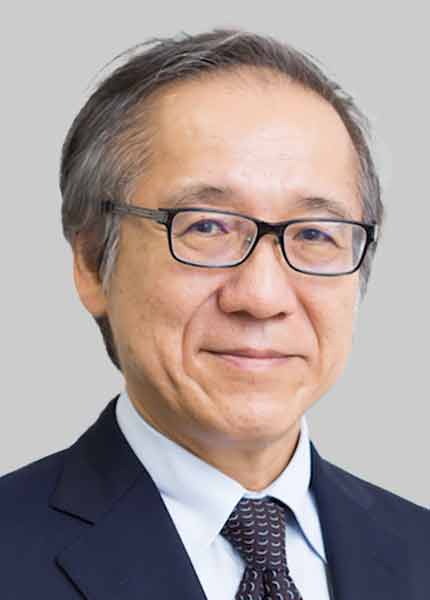
Director, Department of Immunology, National Institute of
Neuroscience, NCNP
Ogawahigashi, Kodaira, Tokyo, Japan
EDUCATION
1984: M.D. – Faculty of Medicine, Kyoto University
1991: Ph.D. – Faculty of Medicine, Kyoto University
PROFESSIONAL TRAINING AND EMPLOYMENT
1980: Passed the Examination of National Board
1980-1981: Resident; Department of Neurology and Geriatrics, Kyoto University
1981-1984: Medical Staff; Department of Neurology, Sumitomo Hospital
1984-1987: Research fellow; National Institute of Neuroscience, NNCP, Tokyo
1987-1989: Visiting fellow; Max-Planck Society, Wurzburg, Germany (Recipient of Alexander von Humboldt scholarship)
1989-1990: Research fellow; Harvard Medical School, Boston, USA
1990-1999: Section Chief; Department of Demyelinating Disease & Aging, National Institute of Neuroscience, NCNP, Tokyo
1999- : Head; Department of Immunology, National Institute of Neuroscience, NCNP, Tokyo
2010- : Director, Multiple Sclerosis Center, NCNP
2016- : Director, National Institute of Neuroscience, NCNP
ACTIVITIES IN SCIENTIFIC SOCIETIES
Co-Chair; Federation of Clinical Immunology Societies (FOCiS) 2007, San Diego, USA
Congress President; Japanese Society of Neuroimmunology 2010, Tokyo
Chair; Neuroimmunology Kyoto Conference 2010, Kyoto
Congress President; Japanese Society of Clinical Immunology 2013, Shimonoseki
Program Committee Chair, 8th International Congress of Neuroimmunology
International Advisory Board Member, International Society of Neuroimmunology (ISNI)
Director; Japanese Society of Neuroimmunology
Director; Japanese Society of Clinical Immunology
Elected Member; Japanese Society of Neurology
Elected Member; Japanese Society of Immunology
EDITORIAL BOARD AND REVIEW
Associate Editor; Clinical and Experimental Neuroimmunology
Editorial Board Member; Therapeutic advances in Neurological Disorders
Editorial Board Member; Immunotherapy
Ad Hoc Reviewer for: Nature, Nature Comm, J. Exp. Med, Trends Immunol, Blood, Brain, Ann Neurol, JAMA Neurol., J. Immunol., Eur. J. Immunol., Int. Immunol., and other international journals
MAJOR RESEARCH INTEREST
1. Translational research of neuroimmunological disorders
2. Autoimmune-mediated pathogenesis of multiple sclerosis and related disorders
3. NKT cell targeting therapy of autoimmune diseases
4. Regulation of autoimmunity
PUBLICATIONS
Author of more than 150 papers published in peer-reviewed journals, including Nature, Nature Immunology, Nature Comm, JCI, Brain, PNAS, Trends Immunol, and of more than 200 review articles and book chapters, related to multiple sclerosis and Neuroimmunology.
Associate Editor for the Book entitled “Multiple Sclerosis Immunology” from Springer (2012).
C.F. 97644730588 | Managed by EEM Services